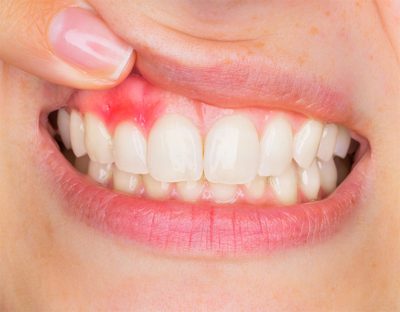 Gingivitis is a very common and mild form of gum disease. It means inflammation of the gums, and it is present in an estimated 50% of the population. If it is left untreated, it can lead to the much more serious oral health condition of periodontitis.
Gingivitis is a very common and mild form of gum disease. It means inflammation of the gums, and it is present in an estimated 50% of the population. If it is left untreated, it can lead to the much more serious oral health condition of periodontitis.
Symptoms
Many people have gingivitis without being aware of it as it is usually painless and the symptoms can be very mild. These include:
- Swollen, tender gums
- Receding gums
- Dark red gums (rather than a healthy pink colour)
- Bleeding gums during or after brushing or flossing
- Bad breath
- Tooth pain or sensitivity
Causes of Gingivitis
The primary cause of gingivitis is poor oral health, as it occurs when plaque containing bacteria accumulates on the teeth. This irritates and inflames the surrounding gum tissues.
In addition to poor oral health, other factors that can contribute to gingivitis are:
- Smoking
- Poor diet, especially one lacking in vitamin C
- Dry mouth
- Stress
- Underlying conditions that affect your immunity, such as diabetes, HIV or cancer treatment
- Some medications such as those for treating epilepsy, angina and high blood pressure
- Hormonal changes especially during puberty, pregnancy and menopause
- Genetics
Treatment for Gingivitis
The most effective way to treat and prevent gingivitis is by improving your oral health through a combination of good brushing and flossing routines at home, regular professional teeth cleaning at dental hygiene appointments, and maintaining dental check ups with your dentist. Your dentist or dental hygienist will recommend the best products and techniques for taking good care of your teeth and gums daily, such as using a particular electric toothbrush or water flosser.
Teeth cleaning appointments with a dental hygienist are a great compliment to your at-home routines, as they provide in-depth cleanings to remove plaque build-up and tartar.
If you suspect you have gingivitis, schedule an appointment with your dentist to prevent the problem from deteriorating. The quicker you begin gingivitis treatment the better your chances of reversing any damage and preventing the progression to periodontal disease.
Please contact us if you have concerns regarding gingivitis – we can conduct an assessment and recommend effective treatment options.